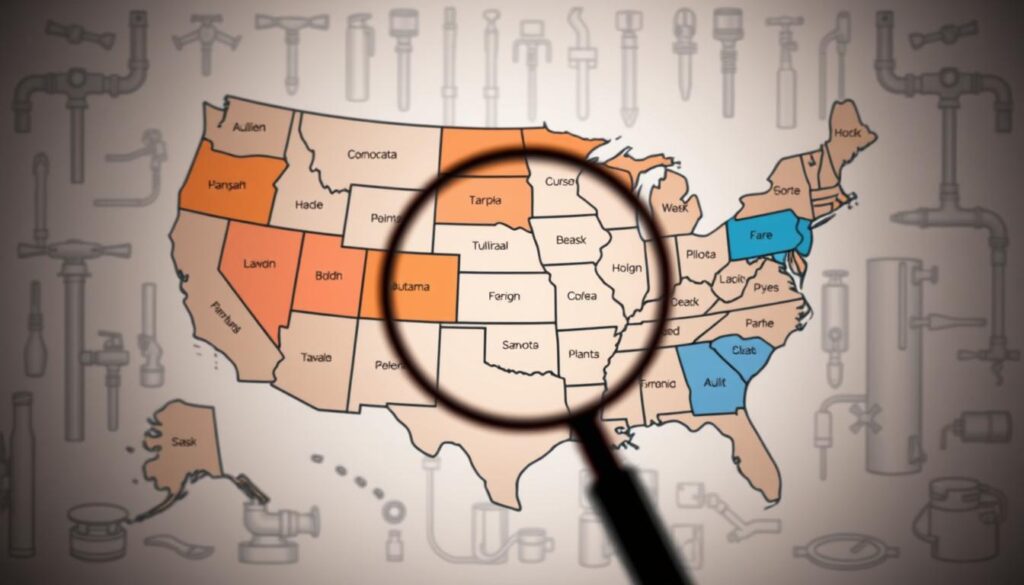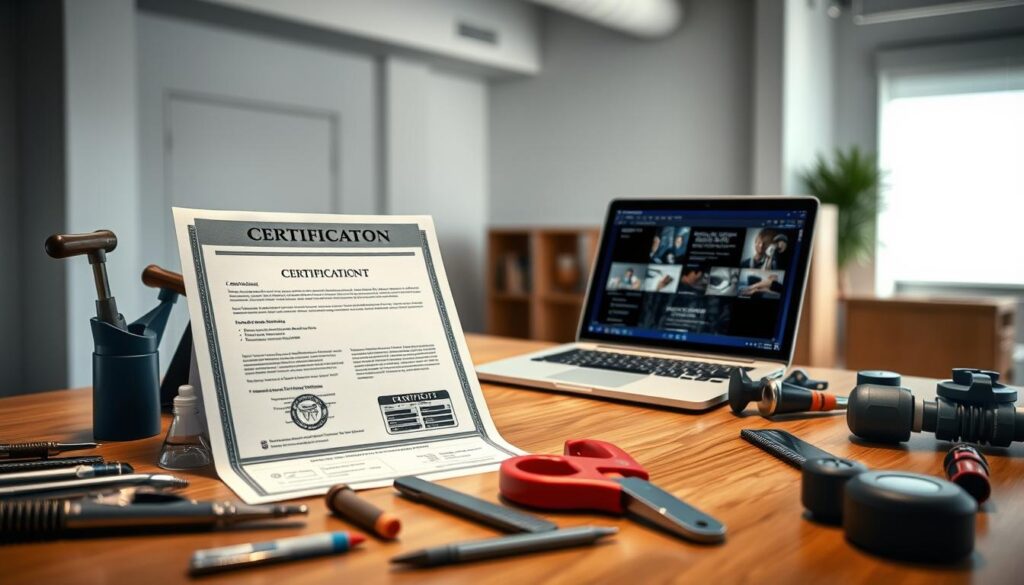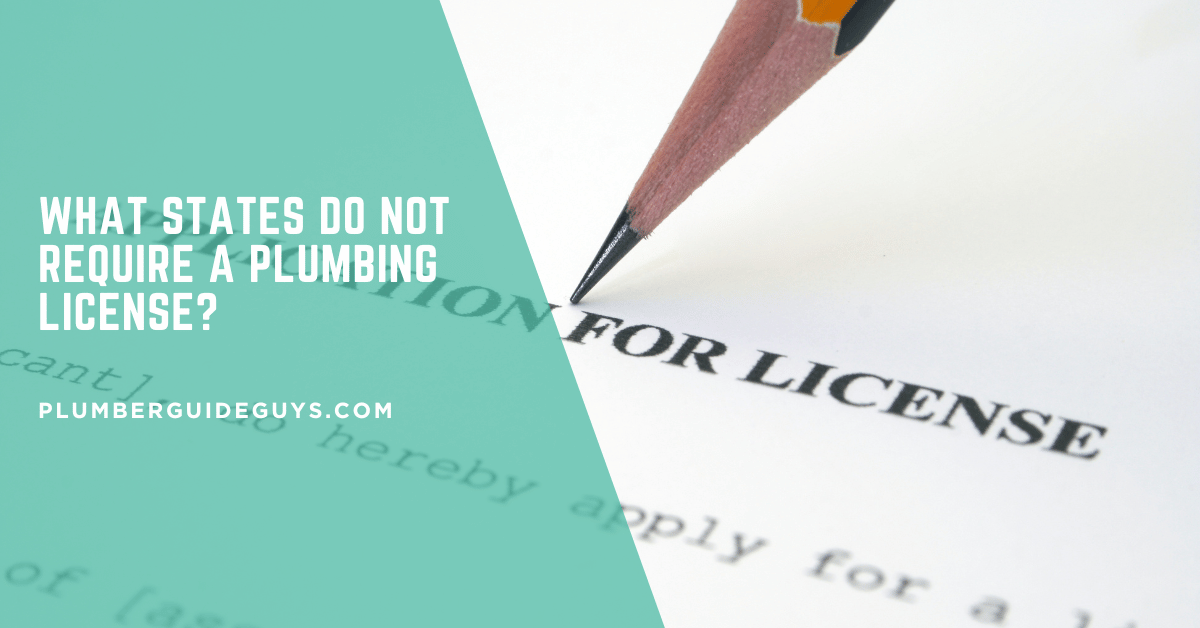Affiliate Disclosure
Plumber Guide Guys is a participant in the Amazon Services LLC Associates Program, an affiliate advertising program designed to provide a means for sites to earn advertising fees by advertising and linking to Amazon.
What States Do Not Require a Plumbing License? Did you know that about 20% of U.S. states don’t require a plumbing license? This fact shows how different plumbing rules are across the country. Knowing which states don’t need a license is key for those starting a plumbing career or homeowners.

Finding out which states don’t require a plumbing license takes research. Some areas have strict rules, while others are more relaxed. Your plumbing career path might depend on your state’s rules.
Licensing rules vary greatly from state to state. Some states need a full license, while others let local areas decide. This mix of rules can be both a challenge and an opportunity for plumbers looking to grow their careers.
Key Takeaways
- Not all states mandate statewide plumbing licenses
- Local regulations can differ significantly from state requirements
- Understanding regional licensing is key for career growth
- Some states rely on municipal or county-level licensing
- Unlicensed plumbing states offer unique professional landscapes
Table of Contents
Understanding Plumbing License Requirements Across America
Plumbing rules vary by state, making it tough for professionals. Plumbing is a regulated field that needs careful attention to licensing rules in different parts of the U.S.
Residential plumbing licenses differ a lot from state to state. Knowing these rules is key for anyone wanting to start or grow their plumbing career.
Different Types of Plumbing Licenses
Plumbing pros go through several license levels:
- Apprentice Plumber: Entry-level with supervised training
- Journeyman Plumber: Intermediate level after apprenticeship
- Master Plumber: Top certification with lots of experience
Regulatory Bodies and Licensing Authorities
Each state has its own group to watch over plumbing rules. These groups make sure plumbers follow certain standards and offer quality service.
| State | Primary Regulatory Body | License Types |
|---|---|---|
| California | Contractors State License Board | C-36 Plumbing License |
| Texas | Texas Department of Licensing | Journeyman and Master Plumber |
| New York | Department of State | Limited and Unlimited Plumbing License |
Common License Classifications
License types often depend on:
- Years of experience
- Education and training
- Passing state exams
- Background checks and references
By knowing these rules, you can move forward in the plumbing world.
States Without Statewide Plumbing License Requirements
For plumbers, navigating states without license rules can be tricky. Many states have their own ways of regulating plumbing. Knowing these rules is key for your career and staying legal.
In some states, there’s no need for a statewide plumbing license. This opens up chances and challenges for plumbers. Here are the states without a statewide plumbing license:
- Kansas
- Missouri
- Nebraska
- New York
- Pennsylvania
- Wyoming
Even without a statewide license, plumbers aren’t free from rules. Local areas often have their own rules to ensure work is done right and safely. Always check the local rules before starting any plumbing job.
Plumbers in these states might want to get voluntary certifications. These show you’re skilled and can help you stand out. Getting better at your job is even more important when there’s no license needed.
Being a pro is more important than any license. Your quality work shows you’re reliable, no matter the state’s rules.
Every state has its own way of handling plumbing rules. Some give more power to local areas, while others trust professionals to follow their own standards. Knowing these rules helps keep both plumbers and customers safe.
Local Licensing Requirements in Unregulated States
Dealing with plumbing rules in states without statewide rules can be tricky. Even though some states don’t require licenses, local areas might have their own rules for plumbers and DIY projects.
It’s important for plumbers to know the local rules in areas without state licenses. Each town or city might have its own way of setting standards and getting certified.
Municipal Regulations
Local governments are key in setting plumbing standards. Some important parts of these rules include:
- Specific permit needs for plumbing jobs
- Local checks on work done
- Minimum skills and training needed
- Registration or certification at the city level
County-Level Requirements
Counties in states without statewide plumbing rules often have their own licensing rules. These rules can change a lot from one county to another. This creates a mix of rules for professionals.
- Some counties ask for skills tests
- Others need specific papers
- Having insurance might be required
City-Specific Licensing
Cities in states where DIY plumbing is legal might have their own licensing rules. For example, big cities might have stricter rules than small towns.
Plumbers need to study local rules well to follow them and avoid legal issues when working in different places.
What States Do Not Require a Plumbing License?
Understanding plumbing laws can be tough. Some states in the U.S. don’t need a plumbing license. This can be both an opportunity and a risk for plumbers.
Some states are known for not needing a plumbing license. These include:
- Kansas
- Missouri
- Nebraska
- New York
- Pennsylvania
- Wyoming
Knowing which states don’t need a plumbing license is key. It lets plumbers and customers know the rules. But, it also means there are things to think about.
“Freedom in licensing doesn’t mean freedom from responsibility” – Industry Professional
In these states, local areas might have their own rules. So, even if the state doesn’t require a license, your city or county might.
For plumbers, this means:
- It might be easier to start working
- You’ll need to show you’re skilled
- Rules can vary by area
Always check local rules before starting plumbing work. Even in states without a license, being good at your job is key. It builds trust with customers.
Benefits and Risks of Working in Unlicensed States
Exploring plumbing certification exemptions by state can be tricky. Some places let plumbers work without needing a license. It’s key to know the rules about plumbing work without a permit to do well in your career.
Plumbers in states with loose licensing rules face a mixed bag. These places might offer some perks, but they also come with big challenges. You need to think carefully about these issues.
Professional Advantages
- Lower entry barriers for new professionals
- Reduced administrative costs
- Faster career progression
- More flexible business operations
Potential Legal Implications
Working without a proper license can lead to big legal problems. You might face:
- Potential lawsuits for substandard work
- Difficulty getting building permits
- Challenges in resolving professional disputes
Insurance Considerations
| Insurance Aspect | Impact in Unlicensed States |
|---|---|
| Liability Coverage | Limited or Higher Premiums |
| Professional Indemnity | Restricted or Expensive |
| Claim Probability | Increased Legal Risk |
Even with plumbing certification exemptions, you must stay proactive. Success comes from knowing local laws, keeping your work top-notch, and safeguarding your reputation.
Alternative Certifications in Non-Licensed States

Plumbers in states without strict rules can show their skills through other certifications. These options prove they meet industry standards.
Looking into plumbing certification exemptions by state shows many ways to be recognized:
- Trade Association Certifications: Groups like the Plumbing-Heating-Cooling Contractors Association (PHCC) have detailed certification programs
- National Inspection Testing and Certification Corporation (NITC) credentials
- Voluntary professional development programs
Even though these certifications aren’t required, they boost your career. Employers and customers see them as signs of skill and commitment.
Benefits of getting alternative certifications include:
- Showing you’re technically skilled
- Making you more employable
- Qualifying you for better jobs
- Documenting your specialized skills
Recommended certifications for plumbers in non-licensed states include:
- Advanced pipe fitting techniques
- Green plumbing technologies
- Commercial and residential systems
Professional development never stops, even in states without strict licensing requirements.
Investing in alternative certifications helps you meet the gap left by licensing rules. It makes you a skilled professional in plumbing.
State-by-State Comparison of Licensing Requirements
Plumbing rules vary a lot across the United States. It’s important for plumbers and homeowners to know these differences. Each state has its own way of regulating plumbing and certifying professionals.
States have different plumbing rules, making it hard for plumbers to work in many places. States with little plumbing regulation offer both challenges and chances for skilled workers.
Fully Licensed States
Some states have strict licensing rules to keep standards high:
- California needs detailed apprenticeship programs
- New York demands tough tests and ongoing learning
- Texas has strict experience needs
Partially Licensed States
Partial licensing means rules are not as strict:
- Local areas might have extra rules
- Some states only need licenses for certain plumbing jobs
- Certification levels change with experience and skill
Unregulated States
States with few rules offer a unique work environment:
- Local areas set their own standards
- Workers must keep quality high on their own
- There’s more room for professional growth
Knowing these differences is key for plumbers wanting to work in different states.
Impact of Non-Licensed Status on Plumbing Business

Running a plumbing business in states without licenses is tough. It’s a world where plumbing without a license is common. Your business faces risks and chances, all at once.
In states where DIY plumbing is legal, rules are less strict. This affects how people see your work. You’ll need to think about a few key things:
- Customers might doubt your skills.
- You might miss out on big jobs.
- Finding good insurance could be hard.
- You could be personally responsible for mistakes.
Plumbers in unlicensed areas must prove they’re good. Building trust is key when there are no set rules. You’ll need to show your skills through:
- Showing off your past work.
- Having professional certifications.
- Getting good reviews from clients.
- Being clear about your prices.
“In unregulated markets, your reputation is your primary credential.” – Professional Plumbing Association
Even though there’s no license needed, you must take on more responsibility. Your success relies on showing you’re skilled, even without a license.
Insurance and Liability in Non-Licensed States
Dealing with insurance and liability in unlicensed plumbing states is tough. Professional plumbers face special risks. These risks can hurt your business and personal money.
Doing plumbing work without a permit is risky. Insurance companies see these states as high-risk. This makes it hard to get good coverage.
- Higher insurance premiums
- Limited liability protection
- Potential legal vulnerabilities
- Reduced professional credibility
To protect yourself in non-licensed states, consider these steps:
- Get professional liability insurance
- Keep detailed records of your work
- Follow the best practices in the industry
- Keep all business records up to date
| Insurance Consideration | Risk Level | Recommended Action |
|---|---|---|
| Professional Liability | High | Secure good coverage |
| Work Documentation | Critical | Keep detailed project records |
| Legal Compliance | Essential | Follow local rules |
Being proactive in managing risks is key in unlicensed plumbing states. Even without strict licensing, protecting your business is vital. This includes smart insurance and keeping good records.
Future of Plumbing Licensing Regulations
The world of plumbing rules is changing fast. New tech and updated standards are making big changes in how plumbers are licensed. This is happening all over the United States.
Several important trends are coming up that will change plumbing licensing:
- Increased standardization of state-level licensing requirements
- Integration of digital technologies in certification processes
- Enhanced focus on water conservation and sustainability skills
- Growing emphasis on advanced technical training
States are working on making their licensing rules more complete. Technology and environmental concerns are driving changes in how plumbers are trained and certified. New digital tools are making it easier to apply for licenses and keep up with continuing education.
The idea of national standards is getting more support. Groups of professionals are pushing for rules that are the same everywhere. This could make it easier to work across state lines and make the industry more professional.
“The future of plumbing licensing is about adaptability and continuous learning,” says Michael Rodriguez, a leading industry expert.
Knowing about these changing rules is key for plumbers. Keep up with new licensing needs to stay ahead in this fast-changing field.
Conclusion
Knowing which states don’t require a plumbing license is key for those in the trade. Even without state-wide rules, you must follow local laws and standards. This ensures your work meets professional expectations.
Plumbing laws differ greatly from state to state. This creates a challenging environment for plumbing experts. In places without state licenses, local areas might have their own rules. So, it’s important to check local laws before starting any plumbing job.
Success in plumbing isn’t just about following the law. Getting voluntary certifications and doing excellent work can make you stand out. Your skills and reputation are more important than state licenses.
The plumbing field is always changing. Stay up-to-date and keep learning. Focus on being the best and you’ll thrive, no matter the licensing rules in your area.

